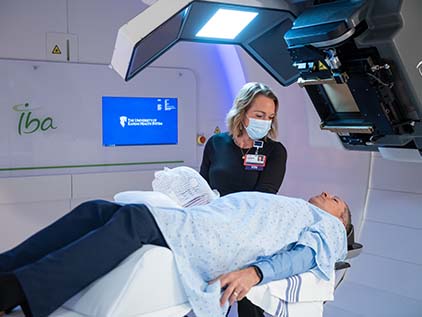Esophageal Cancer

What is esophageal cancer?
Esophageal cancer is a disease where abnormal cells grow in an uncontrolled way within the esophagus. The esophagus is made up of mucous membrane, muscle and connective tissue. Esophageal cancer usually starts at the inside lining of the esophagus and spreads out through the other layers as it grows.
The 2 most common forms of esophageal cancer are named for the type of cells that become cancerous:
- Squamous cell carcinoma is cancer that forms in the thin, flat cells lining the esophagus. It can occur anywhere along the esophagus, but develops most often in the upper and middle part of the esophagus.
- Adenocarcinoma is cancer that begins in the cells that produce mucus. This type of cancer often forms in the lower part of the esophagus, near the stomach.
Esophageal Cancer Symptoms and Risks
Esophageal cancer symptoms can include:
- Constant indigestion and heartburn
- Feeling that food gets “stuck” going down
- Hoarseness and cough
- Inability to swallow some foods
- Pain behind the breastbone
- Painful swallowing
- Weight loss
If you have any persistent symptoms, talk with your doctor. Screening for esophageal cancer is not routine and is typically only done in patients with Barrett's esophagus, a precancerous condition.
There are many possible esophageal cancer causes. While lifestyle changes may reduce some risks of developing esophageal cancer, other risks are not controllable. Risk factors include:
- Being African American
- Being male
- Being older than 50
- Consuming alcohol – more than 1 drink per day for women and more than 2 drinks per day for men
- Having Barrett’s esophagus, a precancerous condition where the cells in the lower part of the esophagus are abnormal, but not yet cancer
- Chronic heartburn or gastric reflux can irritate the esophageal lining, causing the cells to become abnormal over time
- Smoking or chewing tobacco
Esophageal Cancer Screening and Diagnosis
We use the latest technology to detect and diagnose esophageal cancer. Initial diagnostic tests may include:
- Barium swallow, also known as an upper GI series. You’ll drink a liquid that contains barium, which coats the esophagus and stomach to make soft tissues visible on the X-ray.
- Biopsy to remove cells or tissue so they can be viewed under a microscope by a pathologist. Sometimes a biopsy shows precancerous changes in the esophagus as well.
- Endoscopic ultrasound, which combines endoscopy and ultrasound. The doctor inserts an endoscope into the mouth and down your throat into your esophagus, providing detailed images of the gastrointestinal tract and surrounding organs without surgery. We also combine EUS with fine needle aspiration to collect tissue samples. We are one of the few providers in the region offering EUS.
- Esophagoscopy looks inside your esophagus, stomach and upper intestine. After giving you medicine to relax, the doctor inserts a small, flexible tube with a light through your mouth or nose and down your throat into the esophagus. The tube also may have a tool to remove samples of any abnormal tissue.
- Laryngoscopy to look at your larynx (voice box) with a mirror or laryngoscope.
If these initial diagnostic tests reveal that you have esophageal cancer, you will have additional tests to find out whether the cancer has spread. This is called “staging.” Knowing the stage of your cancer will help your cancer care team plan the best treatment. Staging tests may include:
- Bronchoscopy to look inside your trachea and large airways in your lung. The bronchoscope also may have a tool to remove tissue samples. The pathologist will check the sample under a microscope for signs of cancer.
- Imaging tests such as a CT, CAT, PET scan or MRI


Esophageal Cancer Treatment
If you have esophageal cancer, our doctors can evaluate you, offer a second opinion and discuss treatment options. They will work together to find the best course of treatment for you. We have a full range of services to prevent, screen for, diagnose and treat esophageal cancer, including the most advanced diagnostics and the latest surgical and nonsurgical treatments.
Surgery is used for esophageal cancer that has not spread outside of the esophagus. Most often, it involves an esophagectomy. The surgeon removes a portion of the esophagus and pulls the stomach up to join the remaining esophagus. A plastic tube or part of the intestine may be used to make the connection. The doctor also may remove lymph nodes near the esophagus. Our da Vinci® Surgical System can improve the surgeons' precision in esophageal surgeries. Surgery may be followed with chemotherapy.
If the cancer cannot be removed by surgery, a combination of radiation and chemotherapy may be recommended. Novalis Tx™ image-guided radiosurgery is another option for fast, accurate, nonsurgical treatment of esophageal cancer.
Your physician may also recommend proton therapy, which is the leading-edge form of radiation treatment currently available. Proton therapy is a form of external beam radiation that uses energized protons to deliver radiation to a tumor.
You also may be able to take part in a clinical trial for esophageal cancer during your treatment. Our researchers develop clinical trials that are not available anywhere else in the country. Participating in clinical trials may offer you access to promising therapies and will contribute to research that can improve care for future generations of cancer patients.
Living well after esophageal cancer is a lifelong process that includes regular checkups. You may want to learn about lifestyle changes that can speed recovery and improve your quality of life. Be sure to discuss this with your cancer care team. You also may wish to visit the Brandmeyer Patient Resource Center for more information.
Why choose us for esophageal cancer care
If you have esophageal cancer, you will find the leading specialists you need at The University of Kansas Cancer Center. Our interdisciplinary team of cardiothoracic surgeons, medical oncologists and gastrointestinal specialists has years of experience treating hundreds of patients with esophageal cancer.
We design and develop clinical trials to improve cancer treatment and take part in numerous national clinical trials focused on advances in cancer care. As our patient, you will benefit from our staff’s experience with the latest treatment options. You also may be able to take part in a clinical trial for esophageal cancer during your treatment.
Some of our gastrointestinal medical oncologists and thoracic surgeons devote their research and clinical career to developing promising systemic or surgical therapies for people with esophageal and gastroesophageal cancer.
If you have esophageal or gastroesophageal cancer, consider a second opinion with one of our experts. We have multiple promising treatment options, beyond chemotherapy, that are available for every esophageal patient, regardless of stage. Our multidisciplinary team of gastrointestinal experts works closely together to identify the best clinical trial option for you.
Advances in Esophageal Cancer & Barrett’s Esophagus Treatment
Start your path today.
Your journey to health starts here. Call 913-588-1227 or request an appointment at The University of Kansas Cancer Center.